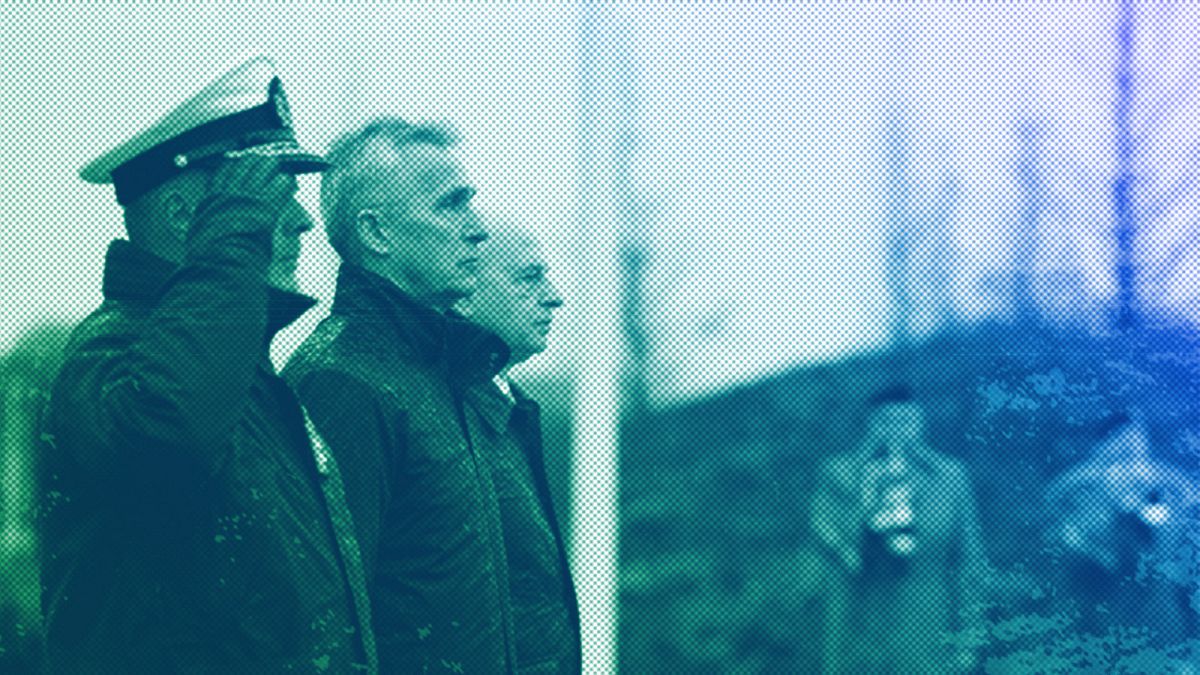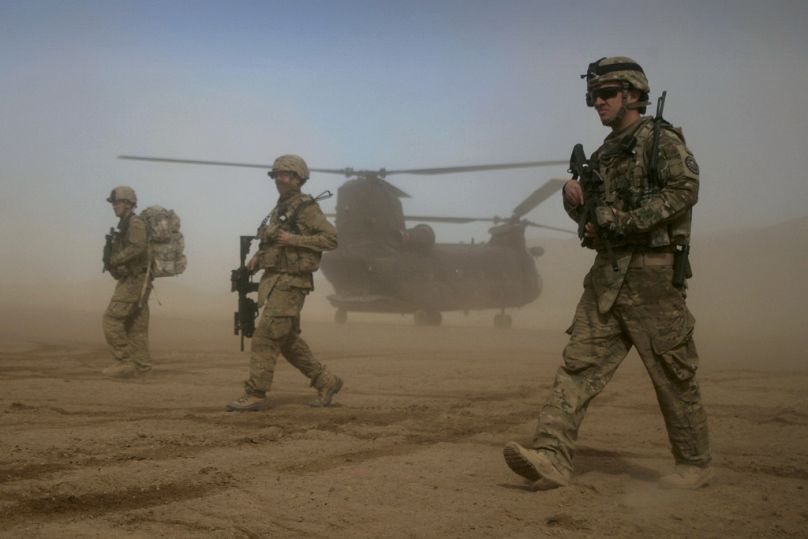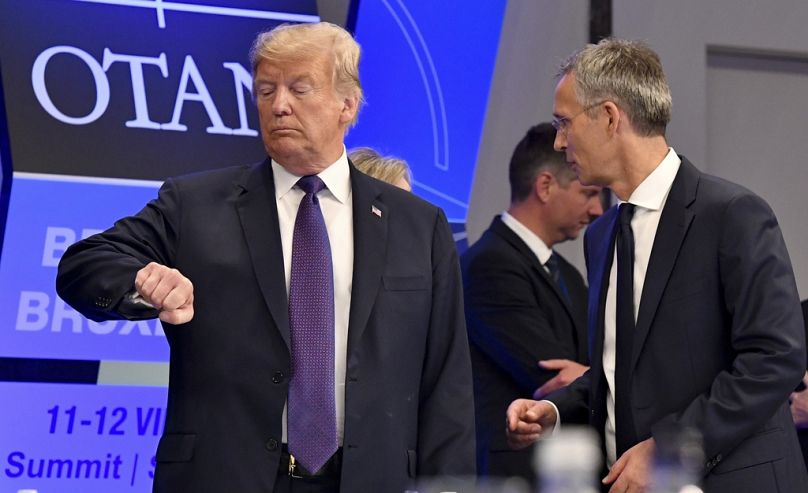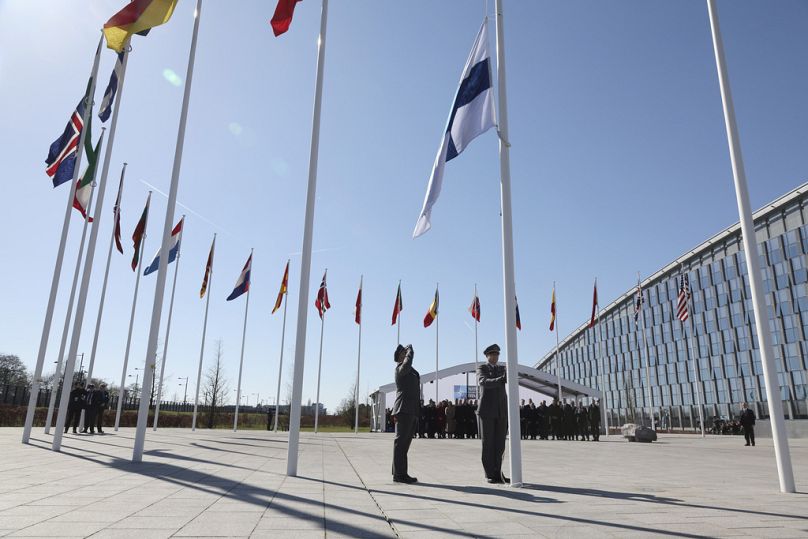The take-home message is that another 75 years of NATO really shouldn’t be taken for granted, Dylan Macchiarini Crosson writes.
This Thursday, NATO turns 75 years old. Since 1949, the world’s largest security and defence alliance has provided collective defence for North America and Europe.
But, unlike a "brain-dead" 75-year-old, NATO has found a new lease on life following Russia’s war against Ukraine and the arrival of two new allies.
While allies should celebrate NATO’s achievements, they must address the challenges facing the alliance and give NATO the best birthday gift possible at its Washington Summit in July — namely, concrete ideas on how to reinforce transatlantic security cooperation under a new secretary general, as we absolutely shouldn’t take the notion of another 75 years of NATO for granted.
Celebrating success
NATO has played a crucial role in working towards a secure Europe, whole and free. As a defensive multilateral framework, it has replaced the types of bilateral and trilateral military agreements that served as tripwires on the path to the tragedies of World War I and II.
How has NATO achieved this success?
First, NATO has found ways to stay relevant as circumstances have changed. From collective defence and deterrence, NATO now focuses on crisis prevention and management, and cooperative security.
It comprehensively tackles issues such as weapons of mass destruction, terrorism, cyber-attacks and hybrid threats, energy and climate change, space, and emerging and disruptive technologies.
Second, NATO has attracted new members, reinforcing the strength of its deterrence with each enlargement.
Following the Cold War, the appetite for NATO’s offer of collective defence guarantees grew even further, welcoming countries from across central Europe, the Baltics, the Balkans, and the Black Sea region that are celebrating important anniversaries in 2024.
NATO’s Partnership for Peace has effectively fostered a common understanding of security challenges across the Euro-Atlantic area and NATO is preparing the groundwork for Ukraine’s eventual entry.
Third, it has broadened its horizons, striking up partnerships with countries in the Mediterranean, Gulf, Central Asia, and Indo-Pacific interested in dialogue and capacity-building on topics ranging from counterterrorism and disinformation to maritime security and nuclear counter-proliferation.
Sustaining relevance
Looking forward, however, NATO cannot afford to rest on its laurels as some long-lasting tensions persist.
Burden-sharing amongst allies is by no means equitable. While Europe has developed a "stronger European personality", it remains overshadowed by US capabilities.
With the prospect of a second Trump presidency, it’s imperative for Europeans to boost their own commitment to NATO. Trump’s position on the collective defence clause has never been clear-cut and his advisors seem poised to prioritise China and divert attention and resources away from Ukraine.
And the importance that the US attributes to Europeans paying their fair share has never been higher, with a Trump administration likely to be even more adamant about this.
Yet only about half of NATO allies are currently spending 2% of GDP on defence 10 years after committing to do so, a far cry from the 3-4% that might be necessary to successfully prepare NATO for the challenges coming its way if US resolve is perceived to waver.
And, more than two years into Russia’s full-scale war against Ukraine, military readiness levels for large-scale war within NATO remain undeniably low.
Despite the NATO Strategic Concept only turning two this year, there are ongoing debates about how far NATO should prioritise anything beyond collective defence.
Moreover, the alliance’s eastern and southern flanks continue to vie for attention, Turkey’s membership contrasts with its multi-vector foreign policy and 50-year occupation of northern Cyprus (e.g. regarding Berlin+ arrangements), and uncertainties linger about EU-NATO relations.
Discussions about how to future-proof NATO by investing in emerging and disruptive technologies have ignored duplicative funding schemes (e.g. the NATO Innovation Fund, EU Defence Innovation Scheme, and country-level initiatives) that dilute impact.
Considering growing US pressure to look towards China and internal reflections about how to address accusations of double standards (e.g. regarding Libya), NATO also struggles with triangulating its partnerships with countries in the Indo-Pacific and Middle East that the EU, UK, US, and Canada also view as strategically important.
From challenges to solutions
It’s simply not enough to treat these challenges as business-as-usual, pursue thinly held compromises subject to political winds, and kick difficult conversations down the road. NATO must propose actionable solutions at the Washington Summit under the leadership of a new secretary general (perhaps a "Trump whisperer").
First, allies must send a strong signal of support to Ukraine. Much could change, with the possibility of NATO countries sending (non-combat) troops into Ukraine now increasingly discussed.
This is happening as allies have settled on delaying Ukraine’s entry without a firm date so as not to become actively involved in the war.
This risks sending a message of acquiescence to Russia in the short term and weakening NATO’s negotiating position vis-à-vis a future victorious Ukraine.
To find the right balance, NATO should grant Ukraine observer status, including an invitation to establish a mission at NATO HQ and participate in North Atlantic Council meetings.
Second, allies — the US in particular — should support Europe’s evolution from strategic dwarf to hard power to enhance spending and military readiness. US political support to the recent European Defence Industrial Strategy will be critical for overcoming intra-European tensions over defence industrial policies that partially result from US pressure to "buy American".
At the same time, French-driven efforts to consolidate the European defence industry shouldn’t be at the expense of common standards and capability inter-operability.
To avoid defence industrial zero-sum games, a high-level transatlantic defence technological and industrial forum should be established to coordinate initiatives at the NATO, EU, and country levels. This should include synergising funding for capabilities development and innovation, fostering intra-NATO technology and arms transfers, and screening for investments by strategic rivals.
Third, allies should focus on how to streamline and group partnerships with Mediterranean, Gulf, Central Asian, and Indo-Pacific countries on specific thematic dossiers, such as disinformation and counter-terrorism, in flexible "transatlantic+" groupings, co-leading with the EU when relevant.
Any major declarations in Washington might be derailed by the possibility that Putin tries to ruin the festivities with a fake peace plan, a headline-grabbing statement by Trump that calls into question the US’ commitment to NATO if he wins the election or a significant battlefield setback for Ukraine as spring turns to summer.
Regardless, the take-home message is that another 75 years of NATO really shouldn’t be taken for granted.
Allies must show resolve, recommitting themselves to NATO’s core aim of collective deterrence, and seek concrete solutions at the Washington Summit — lest the next secretary general begins their mandate on the backfoot.
Dylan Macchiarini Crosson is a researcher in the EU Foreign Policy Unit at CEPS, focusing on the EU's foreign, security, and defence policies, transatlantic relations, and EU institutional and political dynamics.
At Euronews, we believe all views matter. Contact us at view@euronews.com to send pitches or submissions and be part of the conversation.



